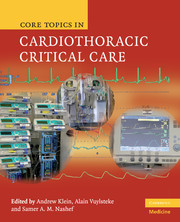Book contents
- Frontmatter
- Contents
- Contributors
- Preface
- Foreword
- Abbreviations
- SECTION 1 Admission to Critical Care
- SECTION 2 General Considerations in Cardiothoracic Critical Care
- SECTION 3 System Management in Cardiothoracic Critical Care
- 3.1 CARDIOVASCULAR SYSTEM IN CARDIOTHORACIC CRITICAL CARE
- 3.2 RESPIRATORY SYSTEM IN CARDIOTHORACIC CRITICAL CARE
- 3.3 RENAL SYSTEM IN CARDIOTHORACIC CRITICAL CARE
- 3.4 HAEMATOLGY AND TRANSFUSION IN CARDIOTHORACIC CRITICAL CARE
- 3.5 GASTROINTESTINAL SYSTEM IN CARDIOTHORACIC CRITICAL CARE
- 3.6 IMMUNE SYSTEM AND INFECTION IN CARDIOTHORACIC CRITICAL CARE
- 3.7 ENDOCRINE SYSTEM IN CARDIOTHORACIC CRITICAL CARE
- 3.8 NEUROLOGICAL SYSTEM IN CARDIOTHORACIC CRITICAL CARE
- 44 Sedation and analgesia
- 45 Neurological complications
- 46 Psychiatric illness during and after discharge from critical care
- SECTION 4 Procedure-Specific Care in Cardiothoracic Critical Care
- SECTION 5 Discharge and Follow-up From Cardiothoracic Critical Care
- SECTION 6 Structure and Organisation in Cardiothoracic Critical Care
- SECTION 7 Ethics, Legal Issues and Research in Cardiothoracic Critical Care
- Appendix Works Cited
- Index
45 - Neurological complications
from 3.8 - NEUROLOGICAL SYSTEM IN CARDIOTHORACIC CRITICAL CARE
Published online by Cambridge University Press: 05 July 2014
- Frontmatter
- Contents
- Contributors
- Preface
- Foreword
- Abbreviations
- SECTION 1 Admission to Critical Care
- SECTION 2 General Considerations in Cardiothoracic Critical Care
- SECTION 3 System Management in Cardiothoracic Critical Care
- 3.1 CARDIOVASCULAR SYSTEM IN CARDIOTHORACIC CRITICAL CARE
- 3.2 RESPIRATORY SYSTEM IN CARDIOTHORACIC CRITICAL CARE
- 3.3 RENAL SYSTEM IN CARDIOTHORACIC CRITICAL CARE
- 3.4 HAEMATOLGY AND TRANSFUSION IN CARDIOTHORACIC CRITICAL CARE
- 3.5 GASTROINTESTINAL SYSTEM IN CARDIOTHORACIC CRITICAL CARE
- 3.6 IMMUNE SYSTEM AND INFECTION IN CARDIOTHORACIC CRITICAL CARE
- 3.7 ENDOCRINE SYSTEM IN CARDIOTHORACIC CRITICAL CARE
- 3.8 NEUROLOGICAL SYSTEM IN CARDIOTHORACIC CRITICAL CARE
- 44 Sedation and analgesia
- 45 Neurological complications
- 46 Psychiatric illness during and after discharge from critical care
- SECTION 4 Procedure-Specific Care in Cardiothoracic Critical Care
- SECTION 5 Discharge and Follow-up From Cardiothoracic Critical Care
- SECTION 6 Structure and Organisation in Cardiothoracic Critical Care
- SECTION 7 Ethics, Legal Issues and Research in Cardiothoracic Critical Care
- Appendix Works Cited
- Index
Summary
Introduction
General advances in perioperative care now allow for the benefits of cardiac surgery to be extended to older and higher risk patients with low operative mortality. High survival in this at-risk surgical population places increased emphasis on complications as determinants of patient outcomes. Neurological complications are a particular concern owing to their relationship with older age and their association with other morbidity.
Clinical spectrum
Neurological complications after cardiac surgery manifest as a myriad of presentations.
Stroke is the most clinically obvious complication with an incidence rate that depends on the type of surgery, the characteristics of the patients and the method of diagnosis (e.g. clinical examination vs brain imaging). The period of vulnerability to brain injury extends beyond the immediate perioperative period and, in many series, the highest incidence is in the postoperative period.
Disorders of consciousness and cognition are a more frequent type of neurological complication than stroke. These complications include encephalopathy, delirium and more subtle disturbances of cognition. In fact, impaired memory, visual disturbances, difficulty with fine motor movements and attention are the commonest types of neurological complications. The frequency of such neurocognitive dysfunction varies depending on the patients studied, the psychometric battery employed, the methods of data analysis and the timing of testing. The rates are much higher the first week after surgery, but many such deficits are reversible and due to pain, electrolyte disturbances, hypoxemia and the residual effects of anaesthetics, sedatives and analgesic drugs.
- Type
- Chapter
- Information
- Core Topics in Cardiothoracic Critical Care , pp. 352 - 361Publisher: Cambridge University PressPrint publication year: 2008

